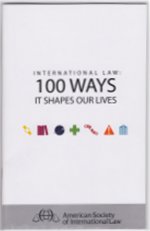
The Euro: making tourist travel in Europe easier and less
expensive.
By: Starkeisha Tucker,
Intern, International Judicial Academy
(In celebration
of the 100th anniversary of the founding of the American Society of
International Law in 2006, the Society published a pamphlet titled International
Law: One Hundred Ways It Shapes Our Lives. The introduction gives an
explanation for its conception: an affirmation that: “international law not
only exists, but also penetrates much more deeply and broadly into everyday
life than the people it affects may generally appreciate.” This column seeks to
elucidate and elaborate on many of the 100 ways briefly presented in the ASIL
pamphlet.)
Over the past 16 years a majority of European countries (19 of
28) have joined a uniform monetary system—converting individual currency to the
euro. The first launch of currency sharing countries occurred in 2003. Twelve
countries including Italy, Spain, Ireland, Germany and The Netherlands
converted.
Because of the introduction of the euro and EU expansions,
citizens of member states may travel

 International
Judicial Monitor
International
Judicial Monitor